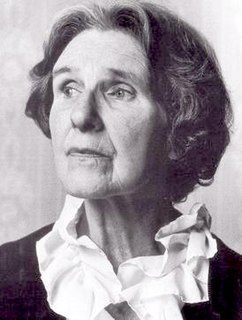
Stella Dorothea Gibbons was an English writer, journalist, and poet. She established her reputation with her first novel, Cold Comfort Farm (1932) which has been reprinted many times. Although she was active as a writer for half a century, none of her later 22 novels or other literary works—which included a sequel to Cold Comfort Farm—achieved the same critical or popular success. Much of her work was long out of print before a modest revival in the 21st century.
John David Caute is a British author, novelist, playwright, historian and journalist.
Hilda Campbell Vaughan was a Welsh novelist and short story writer writing in English. Her ten varied novels, set mostly in her native Radnorshire, concern rural communities and heroines. Her first was The Battle to the Weak (1925), her last The Candle and the Light (1954). She was married to the writer Charles Langbridge Morgan, who had an influence on her writings. Although favourably received by her contemporaries, Vaughan's works later received minimal attention. Rediscovery began in the 1980s and 1990s, along with a renewed interest in Welsh literature in English as a whole.

Margaret Moore Kennedy was an English novelist and playwright. Her most successful work, as a novel and as a play, was The Constant Nymph. She was a productive writer and several of her works were filmed. Three of her novels were reprinted in 2011.
Peggy Webling was a British playwright, novelist and poet. Her 1927 play version of Mary Shelley's 1818 novel Frankenstein; or, The Modern Prometheus is notable for naming the creature "Frankenstein" after its creator, and for being the inspiration of the classic 1931 film directed by James Whale.

Annie Shepherd Swan, CBE was a Scottish journalist and fiction writer. She wrote mainly in her maiden name, but also as David Lyall and later Mrs Burnett Smith. A writer of romantic fiction for women, she had over 200 novels, serials, stories and other fiction published between 1878 and her death. She has been called "one of the most commercially successful popular novelists of the later nineteenth and early twentieth centuries". Swan was politically active in the First World War, and as a suffragist, a Liberal activist and founder-member and vice-president of the Scottish National Party.

An Imaginative Man is an 1895 novel by the British writer Robert Hichens. A tale about a young honeymooning man in Cairo who eventually goes mad after a series of sexual adventures and kills himself at the Great Sphinx, it was a commercial hit and Hichens wrote a number of further books in the orientalist style.

Stay with Me Till Morning is a 1970 novel by the British writer John Braine.
Faye Hammill FRSE is a professor in the University of Glasgow, specialising in North American and British modern writing in the first half of the twentieth century, what is often called 'middlebrow'. Her recent focus is ocean liners in literature. She is a Fellow of the Royal Society of Edinburgh (2021).
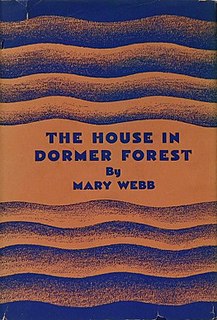
The House in Dormer Forest is a 1920 romance novel by the British writer Mary Webb. It was part of a wave of regional novels set across Britain, in Webb's case in her native Shropshire. She wrote it while living at her home near Bayston Hill. It was one of several works that inspired the later parody novel Cold Comfort Farm by Stella Gibbons.

Seven for a Secret is a 1922 romance novel by the British writer Mary Webb. She wrote to Thomas Hardy asking if she might dedicate the novel to him, to which he agreed. As with her other novels it takes place in her native Shropshire. The title is taken from the traditional nursery rhyme One for Sorrow.
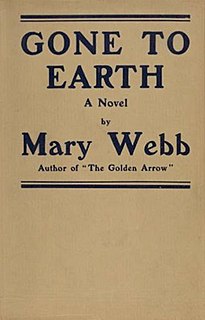
Gone to Earth is a 1917 romance novel by the British writer Mary Webb. It was her second novel following her debut The Golden Arrow the previous year. It received positive reviews and Rebecca West described it as her book of the year. It is set in Shropshire around Long Mynd and Wenlock Edge. In 1935 it was one of the first batch of Penguin Books published.
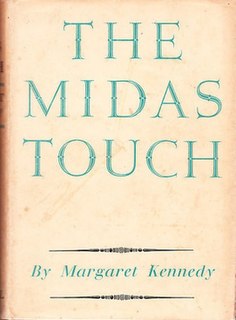
The Midas Touch is a 1938 novel by the British writer Margaret Kennedy. It was her eight novel, she then took a decade-long break before producing her next work The Feast in 1950. It was a Daily Mail Book of the Month.

The Ladies of Lyndon is a 1923 novel by the British writer Margaret Kennedy. Her debut novel, it was rell-received and she followed it the next year with her breakthrough novel The Constant Nymph.
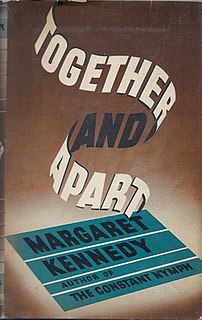
Together and Apart is a 1936 novel by the British writer Margaret Kennedy, her seventh novel. Kennedy was motivated to write it by an increasing number of divorces amongst her acquaintances.

Red Sky at Morning is a 1927 novel by the British writer Margaret Kennedy, her third. Her previous novel The Constant Nymph had been a major critical and commercial success, and it was felt that her new novel failed to recapture this. Sylvia Lynd reviewed it saying "Few novels have so exquisite a forerunner as The Constant Nymph with which to compete. Compared with that, Red Sky at Morning, it must be admitted, is far less moving, less inevitable in the progress of its events, and less well stocked with fascinating characters. Compared with any ordinary novel, however, it is very good indeed - finely wrought, just, sensible, perceptive and witty".

The Feast is a 1949 novel by the British writer Margaret Kennedy. It is a modern reworking of the seven deadly sins. Her ninth novel, it was her first in more than a decade. It was a Literary Guild choice in America.
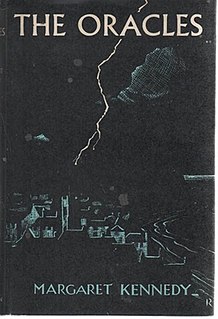
The Oracles is a 1955 comedy novel by the British writer Margaret Kennedy. Kennedy was best known for The Constant Nymph and its sequel The Fool of the Family, but had enjoyed renewed success in the early 1950s, and her previous work Troy Chimneys was awarded the James Tait Black Memorial Prize. It was published in the United States by Rinehart under the alternative title of Act of God.
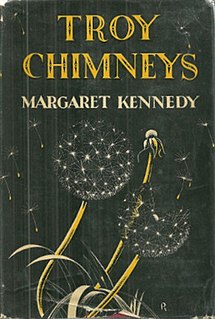
Troy Chimneys is a 1953 historical novel by the British writer Margaret Kennedy. It was awarded the James Tait Black Memorial Prize for Fiction.
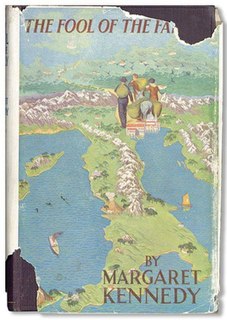
The Fool of the Family is a 1930 novel by the British writer Margaret Kennedy. It is the sequel to her 1924 bestseller The Constant Nymph.
















